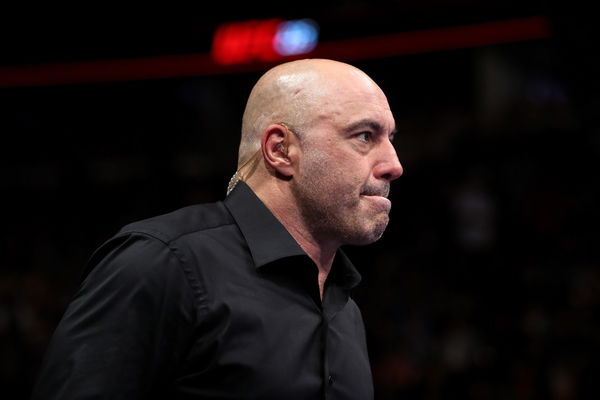
via Getty
CHICAGO, IL – JUNE 09: Joe Rogan enters the octagon during the UFC 225: Whittaker v Romero 2 event at the United Center on June 9, 2018 in Chicago, Illinois. (Photo by Dylan Buell/Getty Images)

via Getty
CHICAGO, IL – JUNE 09: Joe Rogan enters the octagon during the UFC 225: Whittaker v Romero 2 event at the United Center on June 9, 2018 in Chicago, Illinois. (Photo by Dylan Buell/Getty Images)
When Georges St-Pierre tells you that he’s never seen “…a blow from a human being that hard” about your kicks, you must be doing something right! Joe Rogan’s martial arts background has allowed him to break down fights in staggering detail during his time as a UFC color commentator. A US Open Championship winner in taekwondo and a black belt in BJJ, Rogan’s expertise has led him to become an iconic part of the UFC, where he is responsible for turning a generation of combat sports fans into UFC fanatics.
So, why didn’t Rogan compete in the UFC? Training to become an elite fighter isn’t an easy task. Especially when it comes to the prospect of fighting inside a cage. In a recent conversation with neuroscientist Andrew Huberman on the JRE (Joe Rogan Experience) podcast, the podcast host shed some light on the intense and often overlooked mental aspect of being an MMA fighter.
Joe Rogan reveals the ‘dark side’ of what it takes to be a fighter
ADVERTISEMENT
Article continues below this ad
During the JRE Episode no. 2195, Andrew Huberman kicked off the discussion by mentioning that he didn’t take part in a lot of “competitive sports” but he’s always been fascinated by the mindsets of the athletes who do choose that path in life. He then brought up Rogan’s past experiences as a fighter by mentioning, “…like your brain was weaned in fighting a lot of the time?”
Joe Rogan’s response offered a glimpse into the life of a young fighter as he shared, “Well it was also how I developed as a child, I mean, I went from all my puberty years competing, so that’s like, from 15 on, that’s literally what I did all day long.”
This early immersion in combat sports had a profound impact on Rogan’s development. He further explained, “…it’s a f**ked up way to develop your mind….coz the consequences are so grave, you know I always say about MMA that it’s high-level problem solving with dire physical consequences and that’s really what it is. It’s high-level problem-solving. You’re literally doing combat, hand-to-hand combat with your body with someone who’s an expert at it. Which is so crazy.”
View this post on Instagram
But here’s the kicker (no pun intended) — Rogan admitted that this lifestyle wasn’t all glory and adrenaline. He shared, “It’s a nutty way to live but the negative aspects of it are you develop this hyper-competitiveness coz you’re also developing at an accelerated rate when you’re a teenager.”
However, for Joe Rogan, there was another major factor that stopped him from pursuing his combat sports journey any further. A concern about head trauma and the after-effects of hard-sparring sessions eventually forced him away from the life of a prizefighter!
ADVERTISEMENT
Article continues below this ad
Why did Rogan stop fighting?
With his long-time association with the UFC and his impressive martial arts background, it’s a surprise that Joe Rogan didn’t have an MMA fight. While the podcast host is now 57 years old and still in tremendous shape, he had confessed in the past that his fighting career was cut short due to concerns about concussion.
Speaking to former Glory kickboxing champion, Joseph Valtellini on the JRE episode no. 900, Rogan had confessed that, “If I was competing still when the UFC was around, I probably would have done something … when I stopped fighting, it was in 1989, that was the last kickboxing fight I had. And there was nothing, there was no money in it. And I was getting headaches just from sparring.”
ADVERTISEMENT
Article continues below this ad
He also shared that at that time, making money and a career in MMA was still a dream. The first ever UFC event would be held in 1993, many years after Rogan had already decided to hang up his gloves. But MMA’s loss was stand-up comedy’s gain as Rogan revealed, “And so when I started to get into stand-up comedy, I realized, ‘Oh wow, I could make a living doing this.’ Like there’s actually a real path” and the rest is history.
To wrap things up, Joe Rogan’s reflections with Andrew Huberman serve as a reminder that the path of a fighter is as mentally demanding as it is physically, and sometimes, the toughest battles are the ones fought within. Do you think Joe Rogan would have been successful in the UFC? What weight class do you think he would have competed in? Let us know your thoughts in the comments below!
Have something to say?
Let the world know your perspective.


What’s your perspective on:
Joe Rogan's take on MMA fighters quitting—Is the sport too brutal for its own good?
Have an interesting take?